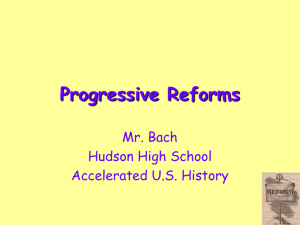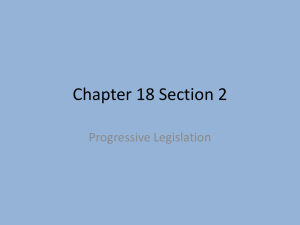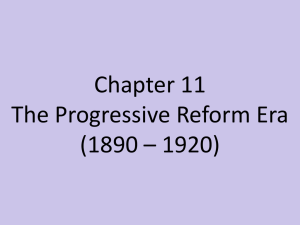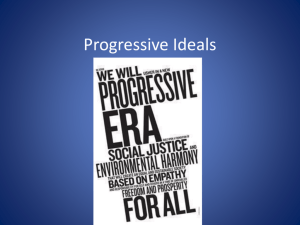Reformers and Progressives - Waverly
advertisement
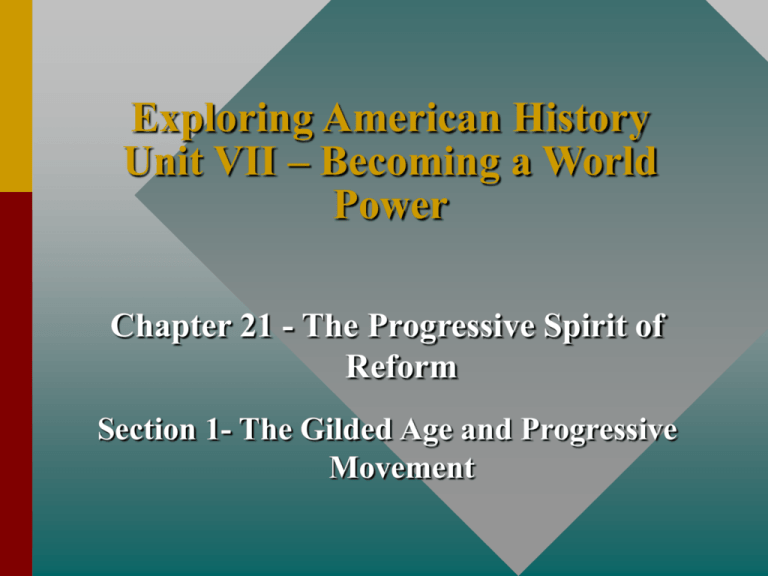
Exploring American History Unit VII – Becoming a World Power Chapter 21 - The Progressive Spirit of Reform Section 1- The Gilded Age and Progressive Movement Birth of the Progressive Era - :52 min. The Gilded Age and the Progressive Movement The Big Idea From the late 1800s through the early 1900s, the Progressive movement addressed problems in American society. Main Ideas • Political corruption was common during the Gilded Age. • Progressives pushed for reforms to improve living conditions. • Progressive reforms expanded the voting power of citizens. Main Idea 1: Political corruption was common during the Gilded Age • Political machines strongly influenced city, county, and even federal politics in the late 1800s. • Political machines used both legal and illegal means to get their candidates elected to public office. – Stuffed ballot boxes with votes for their candidates – Paid people to vote with bribes, or bribed vote counters • Supporters of political machines were often rewarded with government jobs. • The most notorious political machine was New York City’s Tammany Hall, headed by William Marcy Tweed. Corruption in Washington • The administration of Ulysses S. Grant, who was elected in 1868 and reelected in 1872, was charged with corruption. • In Grant’s second term, federal officials were jailed for taking bribes from whiskey distillers. • The scandal caused many Americans to question the honesty of national leaders. Cleaning Up Political Corruption • Rutherford B. Hayes (1877– 1881) promised radical and complete changes in government and made some minor reforms. • Grover Cleveland (1885– 1889, 1893–1897), a Democrat, worked hard to hire and fire people based on merit, not party loyalty. • James B. Garfield (1881) attempted reforms, but was assassinated by a disgruntled federal-office seeker early in his term. • Benjamin Harrison (1889– 1893) helped control inflation and passed the Sherman Antitrust Act. • Chester A. Arthur (1881– 1885), Garfield’s vice president, became president. Backed the Pendleton Civil Service Act passed in 1883. • William McKinley (1897– 1901) avoided scandal and helped win back public trust in the government. Political Corruption • Explain: Why did member of political machines stuff ballot boxes? • Recall: What happened to federal officials who took bribes from whiskey makers during President Grant’s second term? • Predict: If government officials were replaced after each presidential election, what effect would this have on the government’s workforce? Political Corruption • Identify: Which Presidents tried to reform government corruption before 1883? • Recall: In what two ways did the Pendleton Act change the hiring process for federal jobs? Who were the reformers? What did they want? Mostly middle class people (Roosevelt called them Muckrakers) concerned with social issues of the times. Issues such as; immigrants - oldcomers and newcomers city life- poor and needy, and prohibition crime and corruption strikes, Workman’s compensation, minimum wage Political bosses city/state governments- direct democracy, tax laws Giant business corporations Women’s Suffrage Child Labor Main Idea 2: Progressives pushed for reforms to improve living conditions. • Progressives were reformers who worked to solve problems caused by rapid industrial and urban growth. • • • • • Eliminate causes of crime, disease, and poverty Ease overcrowding in cities Advocate for better education Promote better working conditions and less child labor Fight corruption in business and government • Muckrakers were journalists who wrote about child labor, racial discrimination, slum housing, and corruption in business. • Influenced voters, causing them to pressure government officials Muckrakers Name applied to American journalists, novelists, and critics who in the first decade of the 20th cent. attempted to expose the abuses of business and the corruption in politics. The term derives from the word muckrake used by President Theodore Roosevelt in a speech in 1906, in which he agreed with many of the charges of the muckrakers but asserted that some of their methods were sensational and irresponsible. The muckraking movement lost support in about 1912. Historians agree that if it had not been for the revelations of the muckrakers the Progressive movement would not have received the popular support needed for effective reform. Muckrakers Ida Tarbell Lincoln Steffen • Miss Ida Tarbell had been at work for years on her history of the Standard Oil Company, and it began to run in McClure's in November 1902. • Lincoln Steffen's first novel on municipal corruption, "Tweed Days in St. Louis" appeared in McClure's Oct 1902. • Henry Demerest Lloyd's Wealth Against Commonwealth, published in 1894, attacked the Standard Oil Company. • How the Other Half Lives, published in 1890 by Jacob Riis, exposed life in New York's slums. • John Spargo, an Englishman, published The Bitter Cry of the Children, an account of young kids at work in sweatshops. • Perhaps the most famous Muckraking novel, The Jungle by Upton Sinclair, exposed the horrors of the Chicago meat-packing plants and the immigrants who were worked to death in them. Upton Sinclair Jacob Riis Jacob Riis and Upton Sinclair • In 1877 Riis became a police reporter for the New York Tribune. In the 1880s his work gravitated towards reform and he worked with other New York reformers then crusading for better living conditions for the thousands of immigrants flocking to New York in search of new opportunities. He constantly argued that the "poor were the victims rather than the makers of their fate". As a writer Sinclair gained fame in 1906 with the novel The Jungle, a report on the dirty conditions in the Chicago meatpacking industry. The book won Sinclair fame and fortune, and led to the implementation of the Pure Food and Drug Act in 1906. Reform Successes Reforms and Reformers • Progressives started settlement houses, such as Jane Addams’s Hull House. • City planners – Helped design safer building codes – Opened new public parks • Civil and sanitation engineers – Improved transportation – Addressed pollution and sanitation issues, including waste disposal and clean water • Death rates dropped in cities where city planners and civil engineers addressed urban ills. Progressive Programs - 5:35 min. Progressive Movement • The Progressive Movement was an effort to cure many of the ills of American society that had developed during the great spurt of industrial growth in the last quarter of the 19th century. The frontier had been tamed, great cities and businesses developed and an overseas empire established, but not all citizens shared in the new wealth, prestige and optimism. • Progressivism was rooted in the belief that man was capable of improving the lot of all within society. Progressivism also was full of strong political overtones and rejected the church as the driving force for change. Supporters of the movement were found in both major political parties, Democrat and Republican. • Specific goals included: – Remove corruption and undue influence from government – Conservation – Include more people more directly in the political process. – Government must play a role to solve social problems and establish fairness in economic matters. – Race- Blacks and Native Americans – Child Labor, Workers- young and old, workers compensation, – Political Reform- Direct Election, political reform, – Anti- monopoly reform. Social Reforms • Education reform included the enacting of school attendance laws. • Susan Blow opened the first American public kindergarten. • John Dewey advocated new teaching methods designed to help children learn problem-solving skills, not just memorize facts. • Joseph McCormack led the American Medical Association in supporting public health laws. Progressives Push for Reforms • Recall: What sort of reforms did Progressives want? • Making Inferences: What audience do you think muckrakers were trying to reach? Progressives Push for Reforms • Recall: Name three writers who urged reform. • Cause and Effect: What resulted from Upton Sinclair’s novel The Jungle? • Evaluate: What is your opinion of the importance of city planners and engineers? Progressives Push for Reforms • Recall: When did the first public kindergarten open in the United States? • Contrast: How were Dewey’s ideas on education different from earlier methods of teaching? Main Idea 2: Progressive reformers expanded the voting power of citizens. • Progressives worked to reduce the power of the political machines by – Ending corrupt ballot practices – Adopting the secret ballot – Adopting the direct primary, which allowed voters to choose party candidates rather than having it done by party bosses • The Seventeenth Amendment allowed Americans to vote directly for U.S. senators. Recall, Initiative, and Referendum Recall Initiative Referendum • Some states and cities adopted the recall. • Some states adopted the initiative. • Some states adopted the referendum. • It was a special vote that gave citizens the opportunity to remove an elected official from office. • It allowed voters to propose a new law and vote on it. • It permitted voters to directly approve or reject a proposed or enacted law. Government Reforms The Cities • Some cities adopted a council-manager form of government, in which a professional manager runs the city. • Other cities adopted a commission form of government, in which a group of elected officials runs the city. The States • Governor Robert M. La Follette of Wisconsin challenged the power of the political bosses. • He began a series of reforms called the Wisconsin Idea. • His reforms decreased the power of the political machine. • The Wisconsin Idea influenced other states. Progressive Movement • The efforts and successes: • – Interstate Commerce Act (1887) and the Sherman Antitrust Act (1890). – A minority supported socialism with government ownership of the means of production. – conservation movement – railroad legislation – food and drug laws. – elect senators – prohibition – suffrage to women. – Workers compensation, civil service, and minimum wage – efforts to place limitations on child labor were routinely thwarted by the courts. – The needs of blacks and Native Americans were poorly served by the Progressives. – Secret Ballot, Direct Election, direct primary and initiative, referendum and recall Robert La Follette- Leader in reform measures and the candidate of the reform element of his party for the nomination for governor in 1896 and 1898: in 1900 unanimously nominated for Governor of Wisconsin and elected by the largest plurality ever given a candidate for that office. Election Reforms Secret Ballot Direct Primary- People select the candidates INITIATIVE: The people may initiate(propose) by 58% petition of voters a bill to a legislature. REFERENDUM: The people may use referendum (popular ballot) to enact, approve or reject acts of the legislature. RECALL: All elected public officials in the State, except judicial officers, are subject to recall (by petition) by the voters of the State and forced to stand for re-election at any time. 17th Amendment: Direct Election of Senators. The Senate of the United States shall be composed of two Senators from each State, elected by the people thereof, for six years; and each Senator shall have one vote Reforming Government • City Government reforms – New rules for police, releasing debtors from prison and a fairer tax system. – 5 member commission system – Council-manager model • State government reforms • Election reforms – Seventeenth Amendment – Initiative, referendum and recall. City Government Commission Plan Replaced the mayor and council with a small board of commissioners, each elected at large and each responsible for a single area of municipal administration. Under the new plan voters could easily identify and punish those responsible for shortcomings in city services. City Government City Manager scheme Under this plan an elected city council determined basic policy and appointed a professional, nonpartisan city manager who was in charge of the day-to-day operation of the municipality. Worked well in small cities. Critics of corruption urged adoption of nonpartisan elections, new methods of municipal accounting, a civil service system for city employees, and state constitutional amendments to halt state legislative interference in municipal affairs. Expansion of Voting Power • Identify: What ballot change did many states make, after being pressured by Progressive reformers? • Analyze: How did the right to recall officials give voters more political leverage? Expansion of Voting Power • Compare: What is the difference between an initiative and a referendum? • Identify Cause and Effect: What effects resulted from Progressives’ work to reform city governments?
